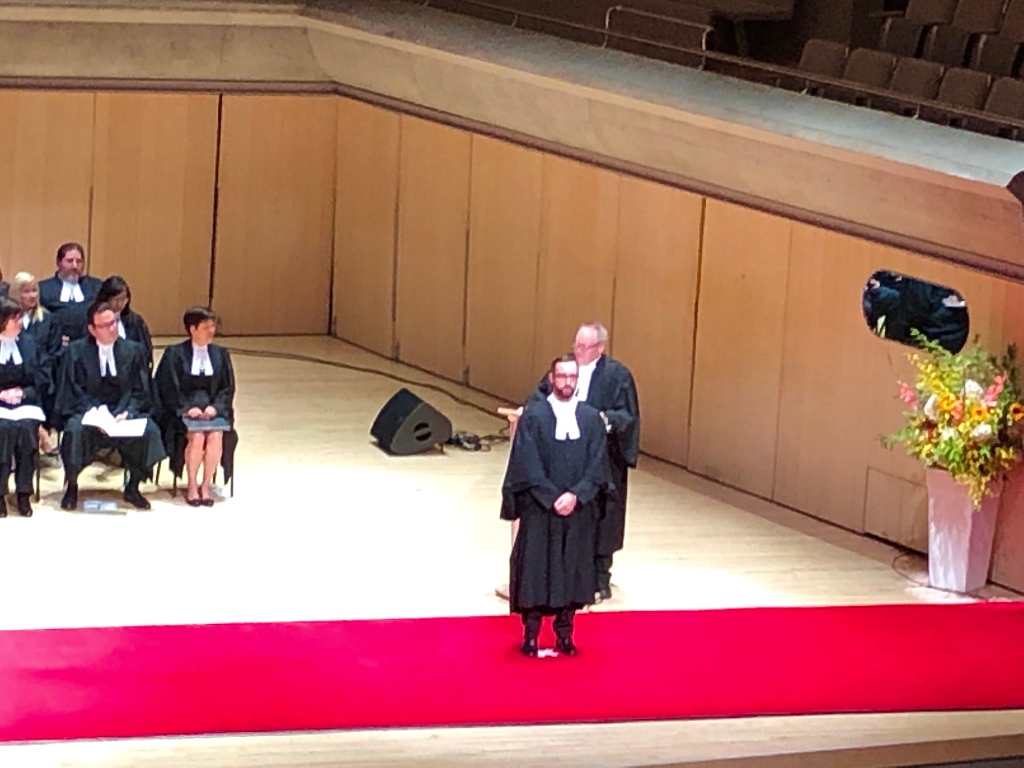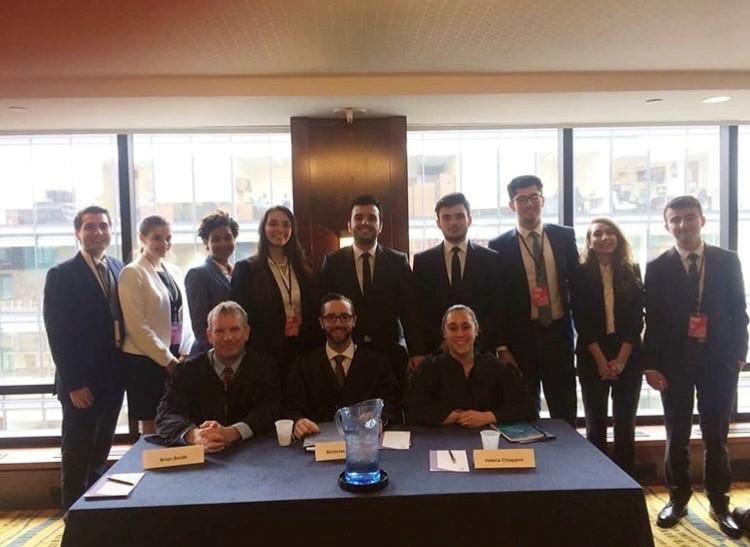
I had the privilege of conversing with Nicholas Arruda, a 2013 graduate of Laurentian University’s Sports Administration (SPAD) program. This article sheds light on his exceptional journey, tracing his remarkable shift from the realm of sports commerce to a thriving and rewarding legal career. Nicholas has been an Associate at Dorsey and Whitney LLP for the last five years, focusing on US Capital Markets Law. Before joining Dorsey and Whitney LLP, he worked at a prominent law firm on Wall Street in New York.
What influenced your decision to pursue a degree in sports business, specifically SPAD?
My journey into SPAD is a bit unique. I always had a passion for sports, and it was clear early on that pursuing a career as a professional athlete wasn’t a feasible path for me. I was inspired by the idea of the business side of sports, especially after watching “Jerry Maguire.” I also understood that for law school, your undergraduate major doesn’t really matter; you need to perform well academically. So, I decided to study something I was passionate about to excel academically.
I was born and raised in Ajax, just outside of Toronto and in high school, I learned about a program in Sudbury where you could work with professional sports organizations and study sports. This piqued my interest, even though I hadn’t heard much about Laurentian University at the time. However, as I delved into the program’s structure and the achievements of its alumni, it became clear that it was a perfect fit for me.
Were you nervous about entering law school, given the differences between your small, tight-knit SPAD program and a large law school cohort?

Absolutely, the transition was intimidating. Moving from a close-knit program like SPAD to a large law school with a diverse range of students and competitive grading systems was daunting. Law school’s competitive nature and academic rigor were challenging, but I found a supportive group of friends who made the adjustment easier. Above all, a strong work ethic is essential to succeeding in law school. Working diligently and putting in the hours is crucial to excel. Smart work is equally important, but a commitment to putting in the effort can help overcome challenges. Developing discipline and resilience, as well as mastering critical legal thinking skills, is key to success in law school. It’s a rewarding but demanding journey that has shaped the lawyer I am today
How did your background in SPAD and sports business influence your legal career and your approach to law?

SPAD has furnished me with a strong foundation that holds remarkable value, benefiting not only my law school journey but also my legal career. Through my experience, several crucial facets stand out.
My academic training in SPAD, characterized by the challenging courses and demanding professors, instilled in me a disciplined work ethic. This discipline has proven indispensable for excelling in graduate school and the professional realm. Additionally, practical experience gained through SPAD, including participation in field trips and real-world projects, provided me with invaluable practical skills. For example, tasks like attending sports events and crafting articles prepared me for real-life scenarios. Moreover, SPAD played a pivotal role in honing my networking skills. The program offered ample opportunities to connect with faculty and alumni. This networking proficiency has become a vital asset in my legal career, where effective networking is a key skill. Furthermore, SPAD’s emphasis on a team-oriented approach is a valuable quality that has transcended into my professional life, proving essential in corporate settings.
I noticed you’re a capital market attorney. Could you share how you ended up in that role?
My path to becoming a capital market attorney was quite extensive. My initial goal when I started in SPAD was to become a sports agent. However, after speaking with agents and realizing the complexities of the sports industry, I decided to take a different route. I learned that a common path to executive roles in sports is through acquiring corporate experience in professions like law, finance, accounting, or consulting and then transitioning into the sports industry. This led me to pursue an MBA concurrently with my law degree to enhance my corporate skills and increase my chances of crossing over.
After completing law and graduate business school, my aim was to secure a prestigious, high-ranking job that would equip me with the necessary skills and resume to facilitate my transition to the sports industry. I was fortunate to land a position at a prominent international law firm in New York, specializing in mergers and acquisitions, bank finance, and project finance. Later, an opportunity arose to work at a firm in Toronto, servicing Canadian clients accessing US capital markets. This shift allowed me to continue practicing as a US lawyer while being closer to friends and family.
Though my focus shifted to capital markets, I’ve always kept my dream of working in sports in the back of my mind. Even in capital markets, there are opportunities to transition into the sports industry. So, while my journey has been long and winding, my background in SPAD has continued to inspire my pursuit of a career in sports, and I’m hoping there will be an opportunity to make that transition one day.
What were the key challenges you encountered when transitioning from sports business to the legal profession?
The biggest challenge I faced was adapting my thinking from solving business problems to approaching legal problems. Legal reasoning and argumentation are distinct skills that require a different mindset. Law school trains you in this respect, teaching you how to perform case law research, draft legal documents, and build legal arguments. The transition in thinking was one of the initial hurdles.
Can you tell us about your involvement in pro bono work as a lawyer?

Pro bono work is a significant part of the legal industry, emphasizing community involvement and giving back. In my experience, pro bono work ranged from researching international legislation for clients to coaching competitive moot programs. It’s a fulfilling way to apply legal skills to make a difference in various areas. Personally, coaching competitive moot programs has taken on a special role in my post-law school journey, allowing me to both contribute to the legal education community and uphold my passion for coaching. Moot court competitions offer students a unique chance to immerse themselves in simulated court or arbitration scenarios, primarily centered around crafting legal memorials and enthusiastically participating in oral arguments. Providing guidance to aspiring students seeking knowledge and experience, much like I once did, has proven to be an immensely rewarding experience.
What advice would you give to students aspiring to follow a similar path from sports business to MBA to law school?
Commitment and early planning are vital. Start early and reverse-engineer your path to law school by focusing on maintaining strong grades, building a well-rounded resume, and gaining interesting and meaningful work experience. Understand the competitive nature of the legal profession and prepare accordingly. Building a well-rounded profile, supported by work experience and solid grades, will help you stand out when pursuing your legal career.

To learn more about Nicholas Arruda visit: